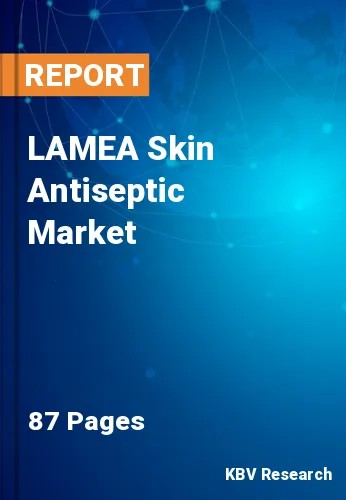The Latin America, Middle East and Africa Skin Antiseptic Market would witness market growth of 12.5% CAGR during the forecast period (2023-2029).
Skin antiseptics are crucial to SSI prevention and should be known to all interprofessional healthcare team members. To get the best results, nurses and clinicians work as an interprofessional team to clean wounds, prep skin for incisional procedures, adequately dress wounds, or care for wounds after surgery. In the upcoming years, the demand for skin antiseptics is anticipated to develop significantly due to the possibility of contamination with pathogenic organisms and the chance of choosing a potential and efficient treatment for resistant organisms.
The skin antiseptic market is anticipated to benefit greatly from selling solution-based skin antiseptics. The greatest revenue-generating category was attributed to the rising incidence of surgical site infections (SSIs), healthcare-associated infections (HAIs), and the widespread availability of different antiseptic products. In addition, the segment is anticipated to advance in the pre-operation and pre-injection procedures due to expanding R&D, a focus on efficacy enhancement, and growing applications of antiseptic solutions. Also, based on the use of skin antiseptics in surgeries, the healthcare industry is increasingly using them, particularly to lower the risk of infection.
The Middle East's population is aging swiftly, and since age is the main risk factor for developing cancer, both its prevalence and incidence are increasing among all residents of the region. A 2012 World Bank study estimates that 4.7% of the 336 million people in the Middle East & Northern Africa (MENA) region have reached the age of 65. This aging population heavily burdens the healthcare system. The elderly are more prone to diseases that may be fatal and necessitate surgery for treatment. The likelihood of surgical site infection (SSI) occurring increases, requiring more procedures. Skin antiseptics are becoming more widely used as SSI prevention measures in this region.
The Brazil market dominated the LAMEA Skin Antiseptic Market by Country in 2022, and would continue to be a dominant market till 2029; thereby, achieving a market value of $64.5 million by 2029. The Argentina market is estimated to grow a CAGR of 13.1% during (2023 - 2029). Additionally, The UAE market would showcase a CAGR of 12.2% during (2023 - 2029).
Based on Type, the market is segmented into Alcohol, Chlorhexidine, Iodine and Others. Based on Distribution Channel, the market is segmented into Drug Stores & Retail Pharmacies, Hospital Pharmacies and Online Providers. Based on Form, the market is segmented into Solutions, Swab Sticks, Cream and Others. Based on countries, the market is segmented into Brazil, Argentina, UAE, Saudi Arabia, South Africa, Nigeria, and Rest of LAMEA.
Free Valuable Insights: The Worldwide Skin Antiseptic Market is Projected to reach USD 2.5 Billion by 2029, at a CAGR of 7.4%
The market research report covers the analysis of key stakeholders of the market. Key companies profiled in the report include XTTRIUM Laboratories, Sirmaxo Chemicals Private Limited, SCHÜLKE & Mayr GmbH, MÖLNLYCKE Health Care (Investor AB), Cardinal Health, Inc., Becton, Dickinson and Company, B. Braun Melsungen AG, 3M Company, PDI Healthcare, Inc. and Ecolab, Inc.
By Type
By Distribution Channel
By Form
By Country
Our team of dedicated experts can provide you with attractive expansion opportunities for your business.

